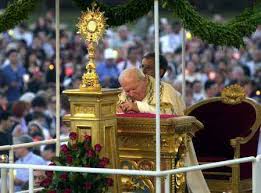A blessed and grace-filled solemnity of Corpus Christi to one and all, a feast that has a long and varied history dating back to the early Middle Ages, with Saint Juliana of Liege (+1258), who, based on private revelations from God, advocated for a day outside of Lent (for on Holy Thursday, we also commemorate the Eucharist, in its inauguration at the Last Super) to celebrate devotion to this Sacrament of Sacraments, the source and summit of the Christian life, as our faith has it. A fruitful read is Pope John Paul II’s 1996 meditation on this feast on the 750th anniversary of its inauguration.
It is not as though the Church began ‘believing’ in the Eucharist in the 12th century, as any perusal of the early Fathers of the Church will evince, to say nothing of the sixth chapter of the Gospel of Saint John chapter 6, and the Bread of Life discourse. We have always believed that Christ, the Word made flesh, has left us his very ‘body, blood, soul and divinity’ present under the species, that is, the appearance or accidents, of simple bread and wine. It was Saint Thomas Aquinas who described with unsurpassed clarity the metaphysical reality of the ‘Real Presence’, that the Second Person of the Trinity, Who presented Himself to us in true human nature, now continues to ‘present’ Himself to us in the Eucharist. Behind the veil of the accidents of bread and wine, there is present the substance, the reality, of Christ, which we adore, and whom we receive in Holy Communion. As the Church teaches, unlike regular food, which we turn into our substance, by consuming the Host, we are transformed, if you will, into His divine Being.
Hence, the necessity of receiving the Eucharist, weekly, even daily as possible and as we are able. Also, the necessity of accompanying worship, adoration and prayer before the Real Presence, which I sort of think of like divine ‘radiation’ that energizes and spiritualizes us, even just by being quiet before God.
Just prior to the establishment of the universal Solemnity of Corpus Christi on the Thursday after Pentecost by Pope Urban IV, Thomas Aquinas had been deputed to write the divine office the feast, and the theologian-philosopher demonstrated himself to be also a poet of divine inspiration. The Dominican retreated to the cathedral at Orvieto, a town that stands on top of a cliff, about an hour’s drive north of Rome, accessible by gondola. It was there sometime between 1259 and 1265 that Thomas wrote the words to the now ubiquitous Pange Lingua and the Verbum Supernum (the last two verses of each are the Tantum Ergo and the O Salutaris, respectively), along with other prayers and hymns still sung throughout the Church (although not nearly as often as they should).
There are, of course, an untold other number of hymns, motets, prayers, litanies, all praising God present in the Holy Eucharist, by which we lift up our own minds and hearts, and solidify our faith in this most august of mysteries, unproveable by science, hidden from the eyes of this world, but all the more perfect a sign and sacrament for being so.
As Thomas wrote in Adoro te devote:
Visus, tactus, gustus in te fallitur,
Sed auditu solo tuto creditur.
Credo quidquid dixit Dei Filius;
Nil hoc verbo veritátis verius.
Which we might roughly translate:
Sight, touch and taste are fallible in you, but is believed only by hearing alone; I believe whatever the Son of God has spoken; there is nothing more true than this word
That last line is in one version rendered as: ‘Truth Himself speaks truly, or there’s nothing true‘ which, although a little less faithful to the original Latin, rings true. We believe, for, as said Saint Peter so truly, where else do we go, O Lord?
Amen.









